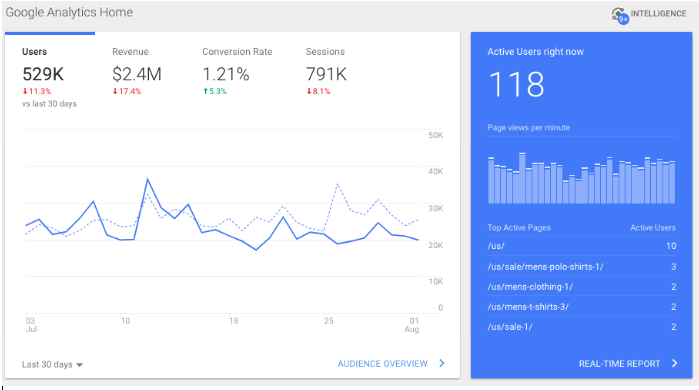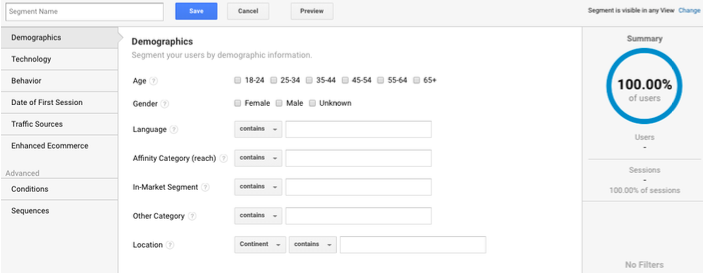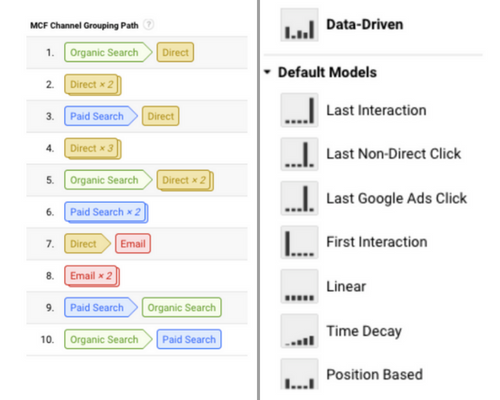 Google Analytics (GA) is the most widely used web analytics service and offers a free as well as a premium platform. It can be implemented on any site and works in conjunction with other Google services such Ads (AdWords), Campaign Manager (DoubleClick), Optimize, Data Studio, and Tag Manager (GTM) – which are all part of the Google 360 Suite.
Google Analytics (GA) is the most widely used web analytics service and offers a free as well as a premium platform. It can be implemented on any site and works in conjunction with other Google services such Ads (AdWords), Campaign Manager (DoubleClick), Optimize, Data Studio, and Tag Manager (GTM) – which are all part of the Google 360 Suite.

Although GA is the most commonly used marketing analytics solution, there are other service platforms and analytics tools such as Adobe Analytics, Matomo and Coremetrics. No matter which service you use, they all track and gather website performance and user behavior to help identify opportunities and insights to make directional business decisions.
Why Does My Company Need Google Analytics?
Every company should use a web analytics solution tools as a part of their digital marketing strategy. Why? It’s crucial in order to learn about your audience and gain actionable insights to learn how to improve your customers’ experience. Companies may think they know who is visiting their site and how they are using it, but many times the answers that come from analyzing customer analytics will surprise you.
GA and other website analytics tools are services that do more than simply collect website and analytics data. You can use it to view the onsite performance generated from your advertising campaigns or PR articles, monitor performance of A/B tests running on your website, create target audience groups, perform a competitive analysis, automate reports, establish performance indicators and create dashboards – where all your analytics data will live. Once you get the hang of Google Analytics and its capabilities, the platform becomes pivotal in helping track your campaigns KPIs. What is a KPI? A KPI is a key performance indicator that conveys the success (or failure) of your campaigns. And you can set up all this data in GA for easy viewing.
Google Analytics Reports can provide actionable insights into:
- Who is visiting your site
- How they got to your site
- What visitors do after they have landed on site
- What is your top-performing content on your site
GA collects web traffic and audience information to inform you who your site visitors are, acquisition data to tell you how users got to your site whether it was through a marketing campaign, a social channel, or by email or other traffic sources. Understanding the data in your analytics reports is crucial to running effective digital marketing campaigns. If you have ever wondered about what percentage of users were visiting on their mobile device, where they lived or what types of interests they have? Well, it’s all here. You can even tell which creative or keywords users clicked-through that brought them to your site, then you can track what they did after they landed. By creating audience segments (photo below), you can take a look at the activity on site and compare it to your average site visitor or another segment to analyze the onsite performance of that group. When analyzing site behavior, you’re able to determine the top-performing web pages by pageview volume, time on page, bounce rate, traffic sources, key metrics or even the revenue that can be attributed back to the page.
 You can set up custom tracking to track pretty much whatever you want on your website to help inform you of important interactions that users take on your site. GA also makes it easy to report on custom goals, conversions, click-through rates and events that were set up in GTM, as well as A/B tests that were set up in Optimize so that all of your data is in one place or dashboard. GA even has a multi-channel conversion report which allows you to view each interaction the user had with different campaigns before converting on the website (left photo) – allowing you to not only report on channels that generated the final conversion rate, but channels that assisted in a conversion as well, helping to optimize future campaigns. Time Lag to a conversion lets you see how long it took from when a user first landed on-page to when they converted. Then with GA’s Attribution Modeling, you can choose how the platform allocates credit to each interaction within the path to purchase (right photo).
You can set up custom tracking to track pretty much whatever you want on your website to help inform you of important interactions that users take on your site. GA also makes it easy to report on custom goals, conversions, click-through rates and events that were set up in GTM, as well as A/B tests that were set up in Optimize so that all of your data is in one place or dashboard. GA even has a multi-channel conversion report which allows you to view each interaction the user had with different campaigns before converting on the website (left photo) – allowing you to not only report on channels that generated the final conversion rate, but channels that assisted in a conversion as well, helping to optimize future campaigns. Time Lag to a conversion lets you see how long it took from when a user first landed on-page to when they converted. Then with GA’s Attribution Modeling, you can choose how the platform allocates credit to each interaction within the path to purchase (right photo).
Multi-Channel Conversion | Attribution Model
 This All Sounds Great, but Now What?
This All Sounds Great, but Now What?
This might sound like a lot, but this article is just scratching the website analysis surface. Google Analytics is a service that anyone could use but takes an experienced analyst to be able to know all the ways to dig into the data to identify the hidden gems most would just scan over.
If you’re interested in taking advantage of what GA has to offer, don’t worry, it’s not as complicated as you might think. If you’re already a decent sized established company, chances are you might already have GA and just don’t know it. As the website and search engine traffic comes in, data will flow into GA and doesn’t need custom set up unless there are specific events and click-through rates on the website you are looking to track or need to set up e-commerce tracking for.
If you’re not sure or need to “hook it up,” have a quick conversation with your developer and they should know exactly what to do – a quick “hey, do we have Google Analytics or another analytics platform installed on the website?” or “Can you install GA on the site please?” should do it. Utilizing Google Tag Manager to install GA on your site is the easier and recommended way. If you don’t have a developer at the ready or setting up custom events or e-commerce tracking sounds like something you want, you can always ask us for help! Our digital analytics team is well versed in using Google Analytics and setting up custom tracking to take your marketing efforts to the next level. Once GA is set up, we can talk SEO next and how to optimize your site to appear in front of the most qualified users. Contact our analytics consultants today.



